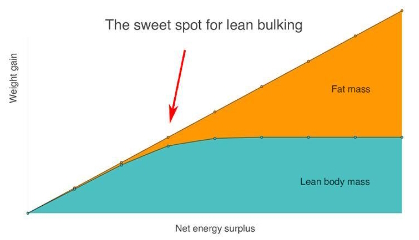Bulking means that you consume more calories than you strictly need, according to your maintenance level. So you create a calorie surplus. But how big should that actually be if you aim for maximum gains?
MISUNDERSTANDINGS
First of all: the term bulking is misleading because it suggests that you should eat as much as you can. This is in fact also the case with steroid bodybuilding, but natural bodybuilding is a completely different profession. If you are a natural, you will quickly grow squishy fat mass instead of rock-solid muscle mass.
Another misunderstanding is that you have to bulk to build muscle mass. That’s not true: even if you eat around maintenance levels or even maintain a calorie deficit, you can build muscle mass. In the latter case, you will also lose some fat and thus stimulate muscle growth and fat loss at the same time, also known as body recomposition. A meta-study from 2022 shows that you can still achieve muscle growth with a calorie deficit of 200 to 300 kcal. Only from a deficit of 500 kcal does muscle growth become very difficult or impossible.
Body recomposition is especially feasible for beginners and people with a high fat percentage. But body recomposition is also sometimes possible for more experienced and/or lean strength athletes.
RESEARCH
What if you aim for maximum muscle growth and don’t shy away from a little bit of fat mass? Then bulking comes into play. So you’re eating slightly above your maintenance level, but how much exactly?
BEGINNERS
A review by muscle growth specialists Alan Aragon and Brad Schoenfeld (summary here) states that beginning and intermediate natural bodybuilders (0-3 years of serious training) should eat about 20 to 40% above their maintenance level if they want to optimize their muscle growth. In practice, this usually amounts to 500-1000 kcal.
Muscle gain is probably greatest when the surplus is mainly obtained from extra carbohydrates, according to this review. Carbohydrates are the most important source of energy for strength training. In addition, the surplus should consist of 20-40 grams of protein, or 0.4 g/kg body weight.
A 2002 study also shows that beginners are the ones who benefit most from a large calorie surplus. The young, novice strength athletes in this study ate approximately 400 to 500 kcal above maintenance. They hardly gained any fat, but they did record a clear increase in dry mass. According to coach Eric Helms, this shows that young, novice strength athletes with relatively normative fat percentages can benefit from fairly aggressive bulking levels of around 500 kcal. This is as long as you train hard and aim for progressive overload.
Beginners simply have the greatest sensitivity when it comes to growth stimuli from training. That is also where the term newbie gains comes from.
INTERMEDIATE/ADVANCED
What if you have already been doing serious strength training for one or two years?
Advanced natural bodybuilders can make do with a smaller calorie surplus, as they have a smaller growth potential. As an advanced athlete, you have already made most of your gains and will have to settle for very slow muscle growth. According to Aragon and Schoenfeld, this includes a modest calorie surplus of 10-20%, or usually 250-500 kcal. That surplus can best be obtained mainly from proteins, namely 20-40 grams, or 0.4 g/kg body weight, and therefore relatively few extra carbohydrates.
A recent study, conducted among experienced strength athletes, shows that there is little difference between a narrow (5%) and a higher (15%) surplus. While with the high surplus, considerably more fat is stored. According to coach Steve Hall, you should therefore aim for a weight gain of 0.25 to 0.5 grams per kilogram of body weight per week with your surplus.
Coach Menno Henselmans says in response to this study:
You’ll get best results by monitoring your progress – strength, body comp and weight gain – and adjusting energy intake based on those to make sure you gain primarily lean mass.
 The sweet spot for lean bulking. (Source: Menno Henselmans)
The sweet spot for lean bulking. (Source: Menno Henselmans)ADVICE
How many calories should you consume for maximum muscle growth with minimal fat gain? You should adjust your diet based on your experience level and how sensitive you are to muscle growth.
Based on the studies discussed and practical experience, coach Eric Helms makes the following recommendations:
- Beginners: 400-500 kcal (weight gain 2% of your body weight);
- Intermediates: 200-300 kcal (weight gain 1% of your body weight);
- Advanced: 100-200 kcal (weight gain 0.5-1% of your body weight).
In other words: beginners 15-20% of the maintenance level, advanced users 5-10% of the maintenance level.
If you want to gain muscle mass and lose fat at the same time (‘recomping’), eat around maintenance or a little bit below that (200-300 kcal).
By monitoring your body weight you can see whether you are eating enough or too little. Nevertheless, the only truly accurate way of measuring is to use a calorie app.